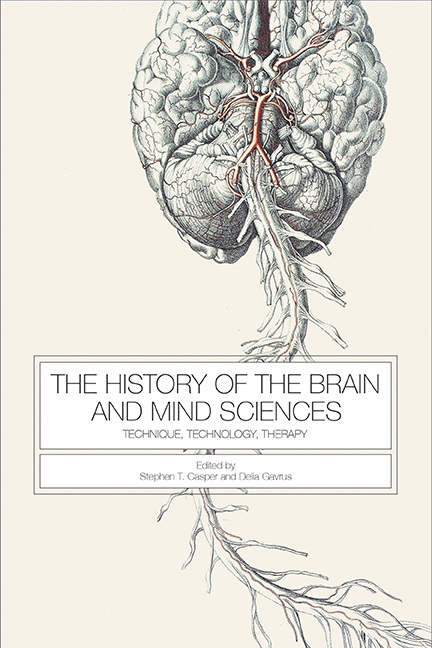Book contents
- Frontmatter
- Contents
- Acknowledgments
- Introduction
- 1 “We Are Veritable Animals”: The Nineteenth-Century Paris Menagerie as a Site for the Science of Intelligence
- 2 “Physiological Surgery”: Laboratory Science as the Epistemic Basis of Modern Surgery (and Neurosurgery)
- 3 Configuring Epidemic Encephalitis as a National and International Neurological Concern
- 4 Circuits, Algae, and Whipped Cream: The Biophysics of Nerve, ca. 1930
- 5 Epilepsy and the Laboratory Technician: Technique in Histology and Fiction
- 6 “What Was in Their Luggage?”: German Refugee Neuroscientists, Migrating Technologies, and the Emergence of Interdisciplinary Research Networks in North America, 1933 to 1963
- 7 Dualist Techniques for Materialist Imaginaries: Matter and Mind in the 1951 Festival of Britain
- 8 A “Model Schizophrenia”: Amphetamine Psychosis and the Transformation of American Psychiatry
- 9 Salvation through Reductionism: The National Institute of Mental Health and the Return to Biological Psychiatry
- Coda: Technique, Marginality, and History
- Bibliography
- List of Contributors
- Index
2 - “Physiological Surgery”: Laboratory Science as the Epistemic Basis of Modern Surgery (and Neurosurgery)
Published online by Cambridge University Press: 26 May 2021
- Frontmatter
- Contents
- Acknowledgments
- Introduction
- 1 “We Are Veritable Animals”: The Nineteenth-Century Paris Menagerie as a Site for the Science of Intelligence
- 2 “Physiological Surgery”: Laboratory Science as the Epistemic Basis of Modern Surgery (and Neurosurgery)
- 3 Configuring Epidemic Encephalitis as a National and International Neurological Concern
- 4 Circuits, Algae, and Whipped Cream: The Biophysics of Nerve, ca. 1930
- 5 Epilepsy and the Laboratory Technician: Technique in Histology and Fiction
- 6 “What Was in Their Luggage?”: German Refugee Neuroscientists, Migrating Technologies, and the Emergence of Interdisciplinary Research Networks in North America, 1933 to 1963
- 7 Dualist Techniques for Materialist Imaginaries: Matter and Mind in the 1951 Festival of Britain
- 8 A “Model Schizophrenia”: Amphetamine Psychosis and the Transformation of American Psychiatry
- 9 Salvation through Reductionism: The National Institute of Mental Health and the Return to Biological Psychiatry
- Coda: Technique, Marginality, and History
- Bibliography
- List of Contributors
- Index
Summary
The first surgical operations on the nervous system originated as part of what contemporaries and later historians have called “physiological surgery.” The proponents of that type of surgery—among them early neurosurgeons— relied on experimental physiology as an important practical, epistemological, and rhetorical resource. Experimental science shaped their particularly thorough and gentle operating style; it provided them with reasons for carrying out particular interventions; it guided them in the way they conducted these interventions in practice; it gave them a frame of reference to evaluate their own and their colleagues’ work; and it helped them secure the profession's and the public's trust.
In this essay I will trace the history of physiological surgery in the late nineteenth and early twentieth centuries, discuss its characteristics, and examine how it emerged within the dynamics of rapid technical change in surgery. I will examine its emergence as a result of the interaction of specific practices and knowledge of various types and also look at its function for justifying the expansion of modern surgery in general and early neurosurgery in particular.
This essay thus explores how the context of the origin of neurosurgery was shaped by a technical approach to body function. Body function was explored and controlled by technical means, and the knowledge produced in this way was seen as being exclusively technical knowledge, hiding, in fact, the intellectual conditions and preconceptions necessary for pursuing such an approach. By the same token, surgical interventions into the body and its functions were also increasingly defined as a purely technical matter. This is, of course, still the general approach in neurosurgery and neuroscience. This essay shows that this technical approach first emerged in relation to the body in general and was only applied to the brain more specifically in the context of physiological surgery. It thus points to a more general context of origin of modern neurosurgery and neuroscience. In doing this, it contributes to revealing the technical contingency of the modern approach to the brain and the interventions into this organ.
- Type
- Chapter
- Information
- The History of the Brain and Mind SciencesTechnique, Technology, Therapy, pp. 48 - 76Publisher: Boydell & BrewerPrint publication year: 2017

